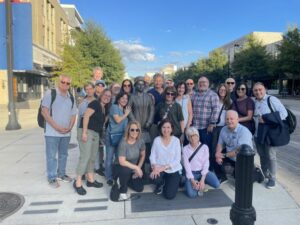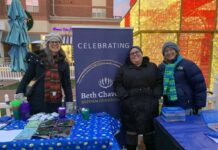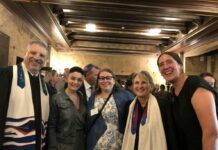
One of the most important ways to build a cohesive and supportive community is to learn about your neighbors – hear about their history, their struggles and learn how they’ve adapted and evolved over time.
That’s the goal Rabbi Evan Krame is working toward as the spiritual leader of The Jewish Studio, an independent synagogue in Bethesda, by taking over 20 members of his congregation south to learn about the civil rights movement through a Jewish lens.
“We have started a series of civil rights missions to the south. We just came back with a group last week and we just announced our next trip for March. And we hope to keep doing those throughout the coming year,” Krame said.
The civil rights missions are the latest step in a series of actions that Krame took after reaching out to the reverend of a historically Black church in Potomac in the wake of George Floyd’s murder at the hands of the Minneapolis Police Department in May 2020.
“Many of us in this community were in shock and in pain but did not know how to be of assistance. I was driving past the Scotland A.M.E Zion Church and saw that they were raising funds to rebuild their church. I called Rev. Dr. Evalina Huggins that day and said to her, ‘You don’t know me, I’m a rabbi, and I want to help you raise money,’” Krame said.
Krame said that over the course of several weeks his community was able to raise tens of thousands of dollars for the church, and he began going to events with Scotland A.M.E, including prayer breakfasts and a Juneteenth event.
He said Rev. Dr. Huggins told him that while he wasn’t the first rabbi she’d ever spoken with, he was the first rabbi she’d ever met, and the two have now a formed a friendship.
“Now, I want to get more of my community to form ties with their [Scotland A.M.E’s] community,” Krame said.
Krame’s experience was further broadened after a civil rights mission trip with the Jewish Federation that he took to Alabama alongside multiple other rabbis. That sparked the idea for Krame to take his own congregants on a similar trip.
“While I appreciated that trip and I enjoyed that trip, I wanted to fashion a trip that spent more time speaking to individuals and more time exploring the Jewish connections than I had previously known about. I was able to fashion exactly that trip for our group,” he said.
The trip that 22 members of The Jewish Studio participated in allowed them to take a deep look at the history of civil rights beyond what’s taught in schools, and at the same time examine the role of Jews in the south during the civil rights movement.
The group looked at the Jewish community’s place in southern society during the civil rights movement and met with experts to reflect on the legacy of the southern Jewish community in order to learn from it.
“We met with synagogues, synagogue leaders and historians during these trips, to learn more about the challenges that the Jewish community faced, to be open about what they could have done and did not do, and also to shine light on what they did do for their African American neighbors,” Krame said.
Krame said the trip and all the new, detailed information they learned caused a lot of eye-opening change for members who were there and had them ‘radically changing their thinking.”
“[They were] dismayed that as we grew up, we did not get this information in schools. It helps us to understand our African American neighbors better, how to be better neighbors, how to be better friends, how to build coalitions,” he said.
Krame said these educational efforts are so important because they enable people to develop a deeper appreciation of the people around them and follow the biblical command of “loving thy neighbor,” noting that “you can’t love your neighbor if you don’t know them.”
Krame added that being engaged in civil rights is a Jewish imperative, which is something he hopes to continue teaching to his congregants, along with planning future civil rights trips.
And being engaged and being there for other communities is especially important for the Jewish community with the recent surge in antisemitism. Krame stressed that now is not the time to withdraw from connecting with other minority groups and caring for all people.
“I believe that it [being engaged] gives us a greater sense of pride in our heritage, in our abilities to connect. And it teaches us how to be better advocates for ourselves as well. Because we need friends in this world, we need to build coalitions. And you can only do that when you form personal relationships with other people and their struggles,” he said.





